Caring for Aging Adults
The story was co-published with Black Voice News as part of the 2024 Ethnic Media Collaborative, Healing California.
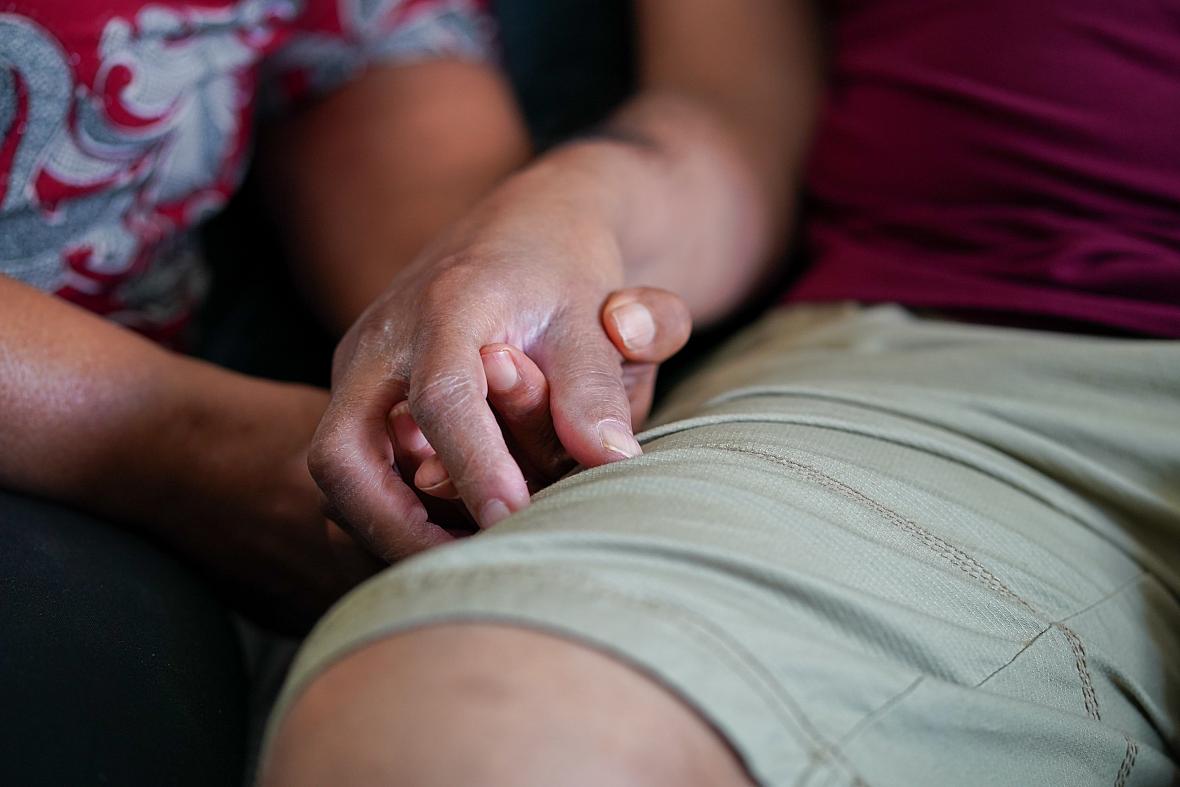
Siblings Camilla Bradford, 64, and Reginald “Reggie” Arnwine, 65, clasp hands in their home on October 9, 2024. “My most rewarding part of [caregiving] is seeing him get up with a smile”, Bradford said, reflecting on Arnwine’s growth and seeing him excel. “If he can tie his shoe today, we celebrate that victory today. If he puts on his shirt today, that's a reason to celebrate, because tomorrow he might not remember that.”
(Aryana Noroozi for Black Voice News/ CatchLight Local)
For Camilla Bradford, 64, no day has been the same since 2008, when she became her brother’s caregiver. Arnwine is a year older than Bradford, but has the cognitive development of a preschooler. Sometimes Bradford is up all night because her brother, Reginald Arnwine, can’t sleep. Since Arnwine has trouble with external caregivers, which can lead to physical altercations, care is exclusively provided to him by family members, including Bradford’s husband and son.
“The most challenging [part] is just not knowing if it's considered a good day for him or a bad day. Another one would be getting material that I need for him,” Bradford said.
While many caregivers share similar struggles, those like Bradford, who are aging adults themselves, experience a unique set of challenges.
“You have to have the strength to provide care for those other hours that nobody sees and it wears on your body,” Bradford said, reflecting on the difficult parts of caregiving. “A challenge is keeping myself healthy, and that's a fight. If I send him to [an adult day] program, whatever [cold] he catches, he brings to me, I get it all.”
Bradford is a registered caregiver through the In-Home Supportive Services (IHSS) program. IHSS is a state, federal, and local program that helps pay for services so that people can stay in their homes to receive care. Family members, who already provide a majority of – or even, full time care, for their loved ones – register through IHSS and receive compensation.
She explained that the strain on her mental health and a lack of support were major tolls on her well-being. Though Bradford has been a member of United Domestic Workers (UDW) for nearly 10 years, she said she needs more direct support. UDW collectively bargains for wages and benefits, provides education to IHSS Providers on an ongoing basis, employs lobbyists to the government and advocates for other issues on behalf of IHSS Providers.
“Even though I have a great group with me, supporting me, it’s still not enough. It's not enough,” Bradford said.
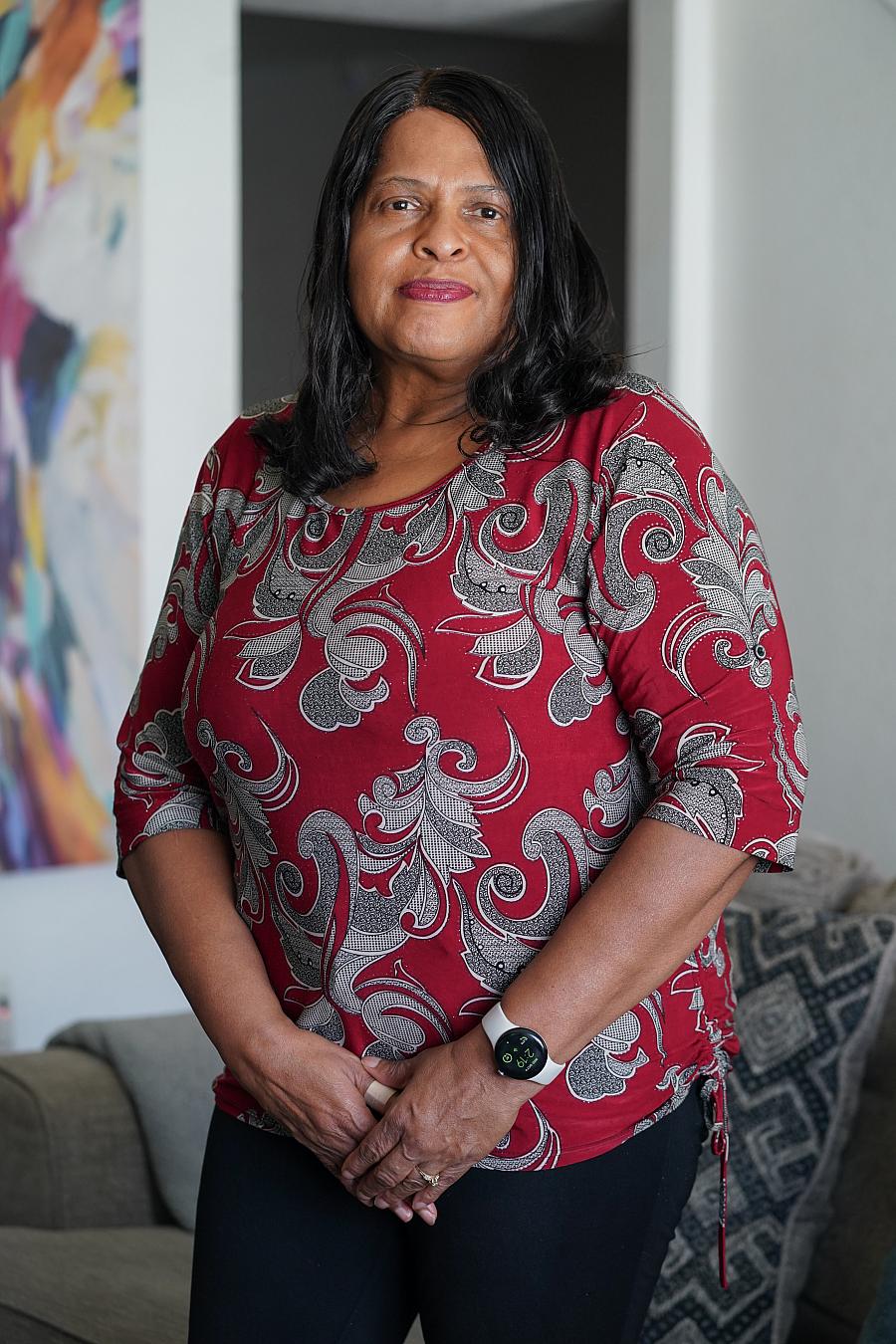
Camilla Bradford, 64, poses for a portrait in her home on October 9, 2024. Bradford has been the caretaker for her brother Reginald (Reggie) Arnwine, 65, for over ten years, after their mother asked her to take care of him as she passed away. Bradford says the most challenging part of caretaking is the constant worry and the most rewarding part is that she learns something new everyday. She has traveled to every state with Arnwine, which was one of their mothers wishes. When it comes to their needs she says that Arnwine is her priority. “I can make the sacrifices,” Bradford said.
(Aryana Noroozi for Black Voice News/ CatchLight Local)
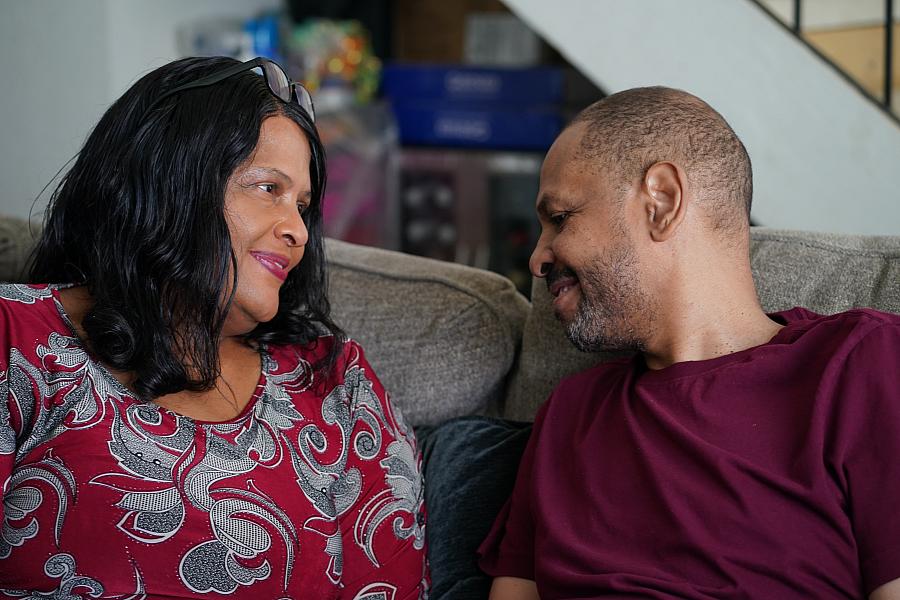
Siblings Camilla Bradford, 64, and Reginald “Reggie” Arnwine, 65, share a moment in their home in Moreno Valley, California on October 9, 2024. Bradford has been the caregiver for Arnwine for over 10 years, after their mother asked her to take care of him as she passed away. “You have to have the strength to provide care for those other hours that nobody sees and it wears on your body,” Bradford said, reflecting on the difficulties of caregiving. “A challenge is keeping myself healthy, and that's a fight. If I send him to [an adult day] program, whatever [cold] he catches, he brings to me, I get it all.” She went on to describe the greatest challenge is the risk to her mental health and a lack of support. “Even though I have a great group with me [at UDW], supporting me, it’s still not enough.”
(Aryana Noroozi for Black Voice News/ CatchLight Local)
National Family Caregivers Month (NFCM) is celebrated every November to honor and recognize family caregivers in the United States. As NFCM comes to a close, Black Voice News continues to uplift caregiver experiences through reporting and community engagement.
Black Voice News interviewed and photographed caregivers to highlight their experience caring for aging adults.
Sisters Delnita Brown and Le’Era Boyd
Delnita Brown, 55, is a caregiver for her younger sister, Le’Era Boyd, who has been afflicted with a neurological condition since birth including Cerebral Palsy and Hydrocephalus, which require brain shunts, a medical device that drains cerebrospinal fluid and redirect it to be reabsorbed. As Brown ages, she is worried about how Boyd’s care will continue.
“If I [leave] this earth tomorrow, I want to make sure that [our family] knows that they still have to make sure Le’Era continues to get all her needs met. And [I] always tell them, ‘Don't drop the ball,’” Brown said, explaining she has a promise to fulfill.
According to the Center for Health Policy Research , more than two-thirds (67.5%) of caregivers in California are middle aged, with nearly 40% between the ages of 45 and 64. California's aging population is growing quickly. By 2030, twenty five percent of the state's population will be over the age of sixty, increasing the need for caregivers.
While Bradford and Brown both shared their challenges in caring for aging adults while aging themselves, they also shared the most rewarding moments.
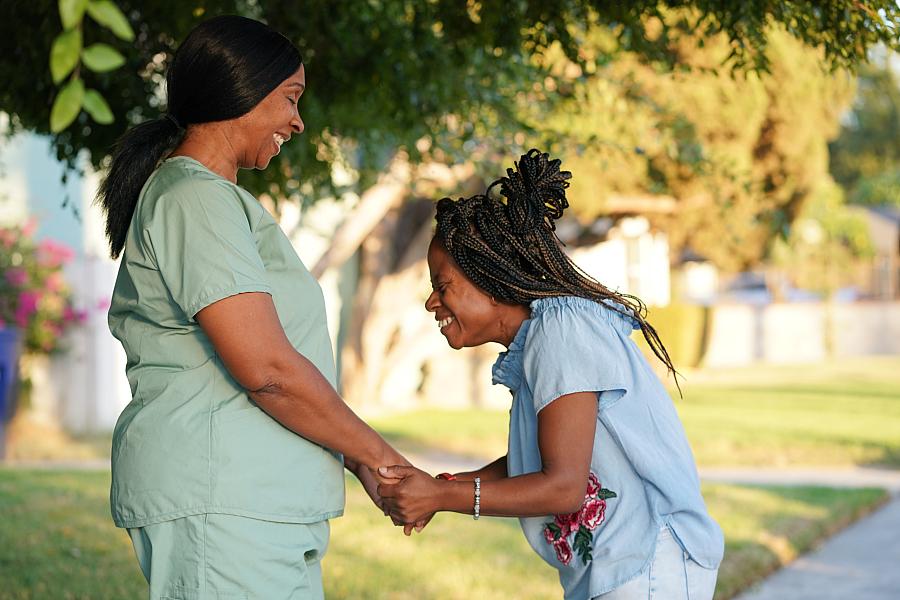
Sisters Delnita Brown, 55, (right) and Le’Era Boyd, 44, (left) share a moment outside of their home in Riverside, California on October 9, 2024. Brown has been caring for various family members and outside clients for over 28 years. For the past 19 years she has been Boyd’s caregiver. “I look at her and I know where she came from,” Brown said, adding that one of the most rewarding parts of care[giving] is seeing her sister’s success.
(Aryana Noroozi for Black Voice News/ CatchLight Local)
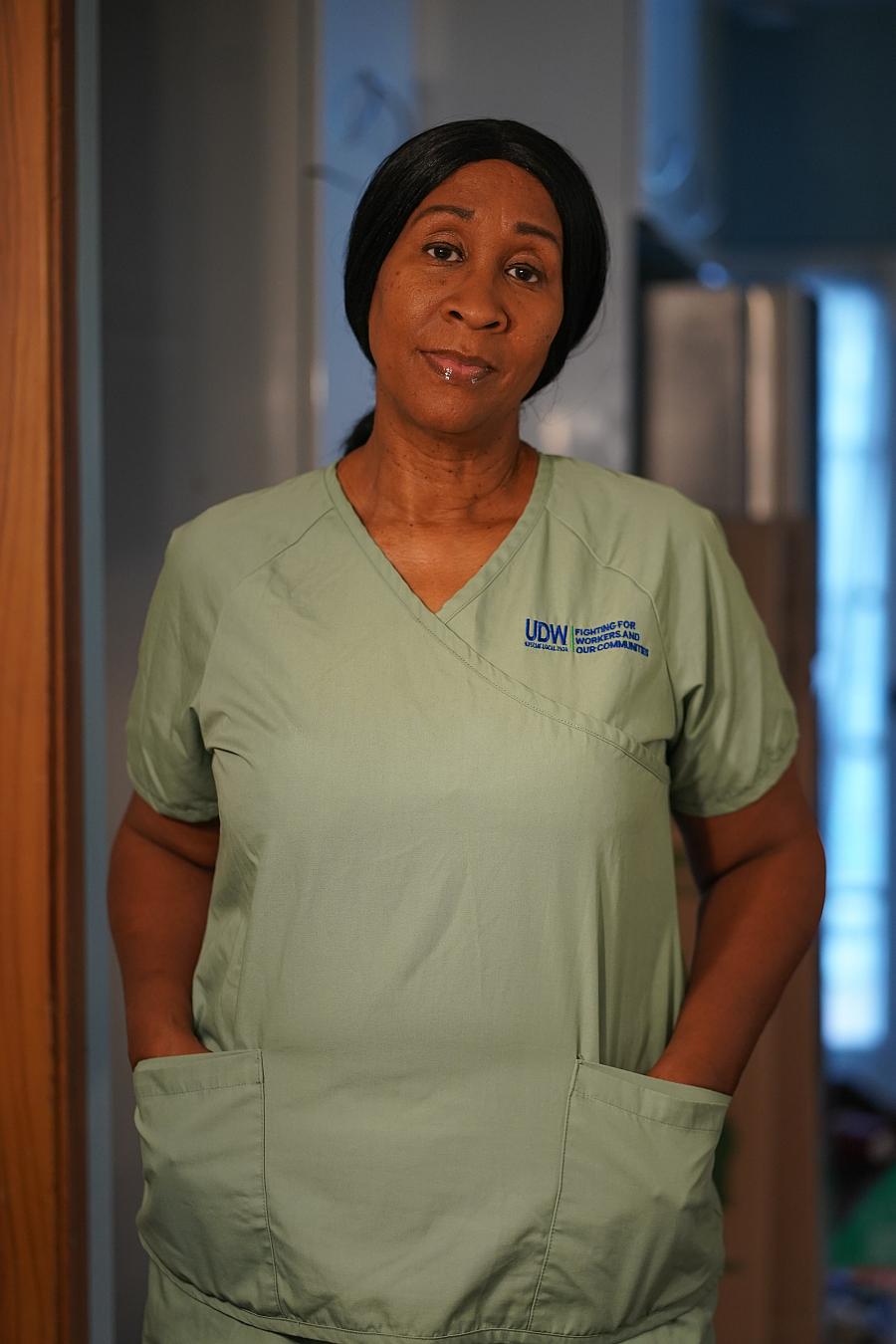
Delnita Brown, 55, poses for a portrait in her home in Riverside, California on October 9, 2024. Brown has been caregiving for family members and outside clients for over 28 years. For the past 19 years she has been taking care of her sister, Le’Era Boyd, 44. Boyd suffered neurological and other complications from her existing neurological condition after giving birth in 2005. Boyd moved in with Brown during her pregnancy. Shortly after, Brown officially became Boyd’s caregiver, helping her raise her son who is now 19 years of age and attending college. “Le’Era will always be okay, because I made her come here. I made a promise to her 19 years ago. ‘You're gonna come here with me, and I'm gonna take care of you and your son.’ I said that and my word is bond.”
(Aryana Noroozi for Black Voice News/ CatchLight Local)
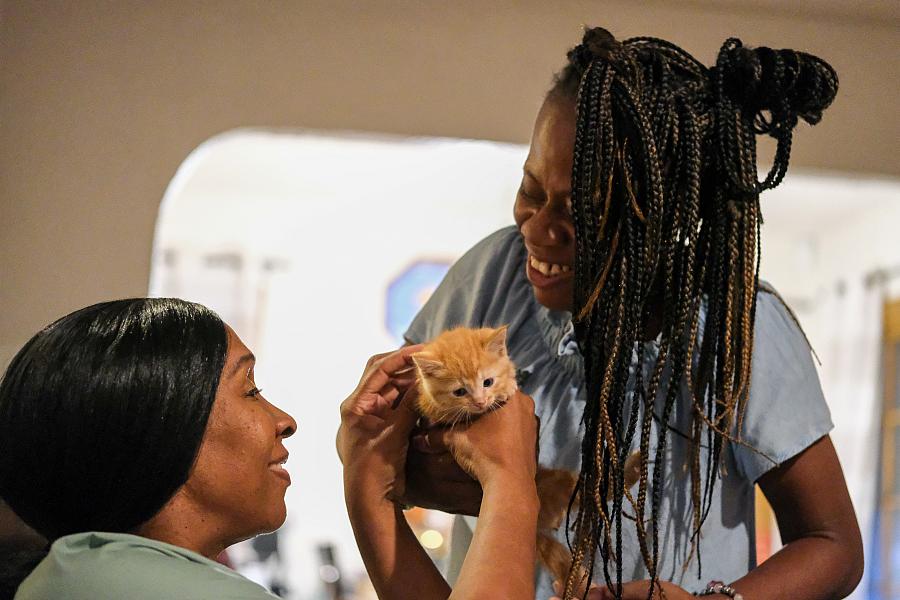
Sisters Delnita Brown, 55, (left) and Le’Era Boyd, 44, (right) play with a kitten belonging to Boyd’s son, Davion, in their living room in Riverside, California on October 9, 2024. “[Seeing] [Le’Era] and Davion is the most rewarding part for me. I know that I raised him because she got sick, but I still allow her to be the mom…and I'm the auntie, and anybody that knows me will say, ‘That's Davion's auntie, and that's his mom.’ So the rewarding part for me is just seeing my sister's success, that she made it and she was allowed to have a son when she wasn't supposed to have a child.” Today, the three work as a team in caring for Le’Era.
(Aryana Noroozi for Black Voice News/ CatchLight Local)
Caregivers Winfred and Gloria Roberson
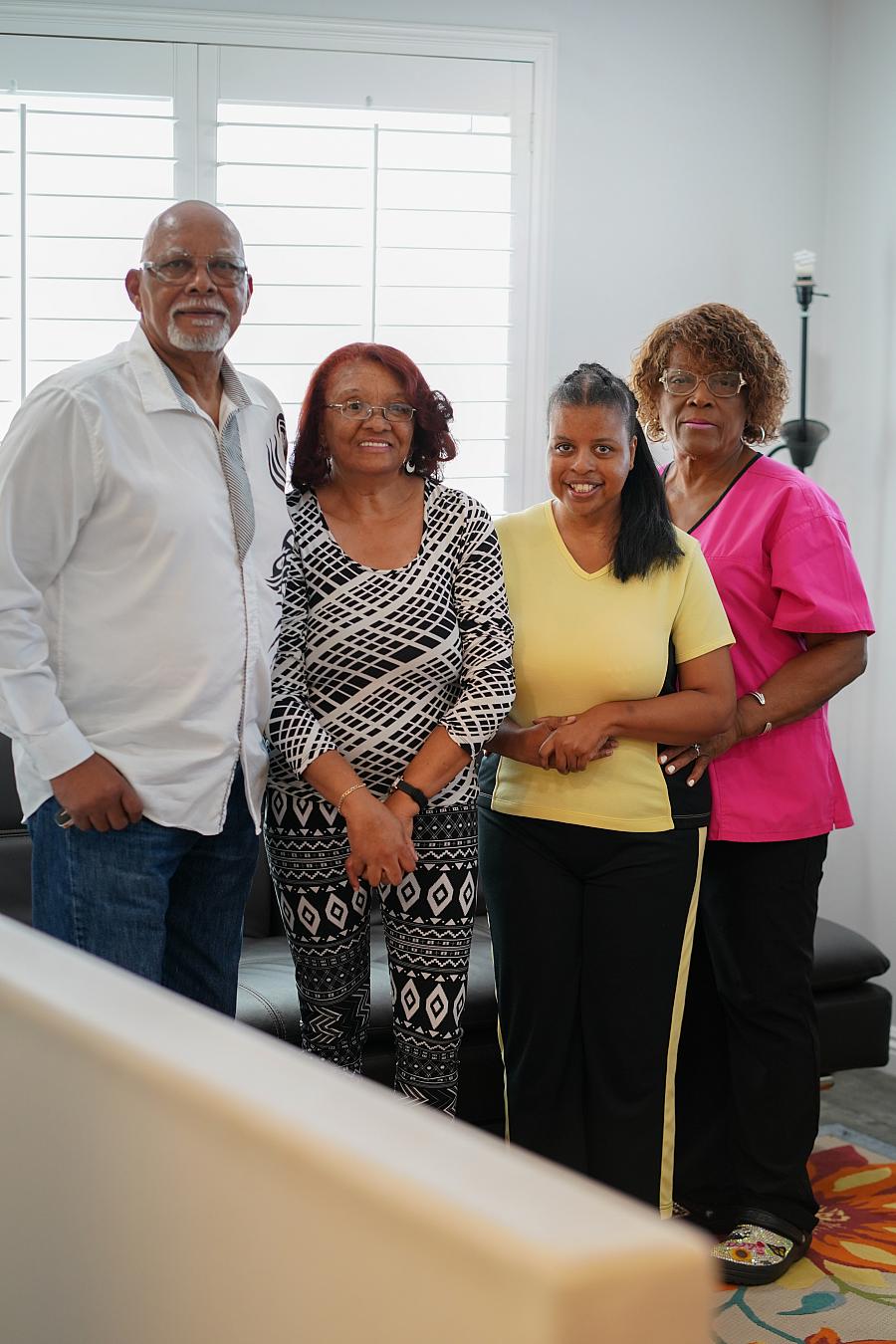
(From left to right) Winfred Roberson, 83, Cheryeze Green, 55, Ebony Ross, 46, and Gloria Roberson, 80, pose for a portrait in their home in Jurupa Valley, California on October 14, 2024. The Robersons are caregivers for Ebony Ross, 46, and Cheryeze Green, 55. The couple sees caregiving as an assignment from God. “We didn’t offer them a room, we offered them a home,” said Gloria. “They are part of who we are.” She added that she wants the girls to see that their capability is greater than their disability.
(Aryana Noroozi for Black Voice News/ CatchLight Local)
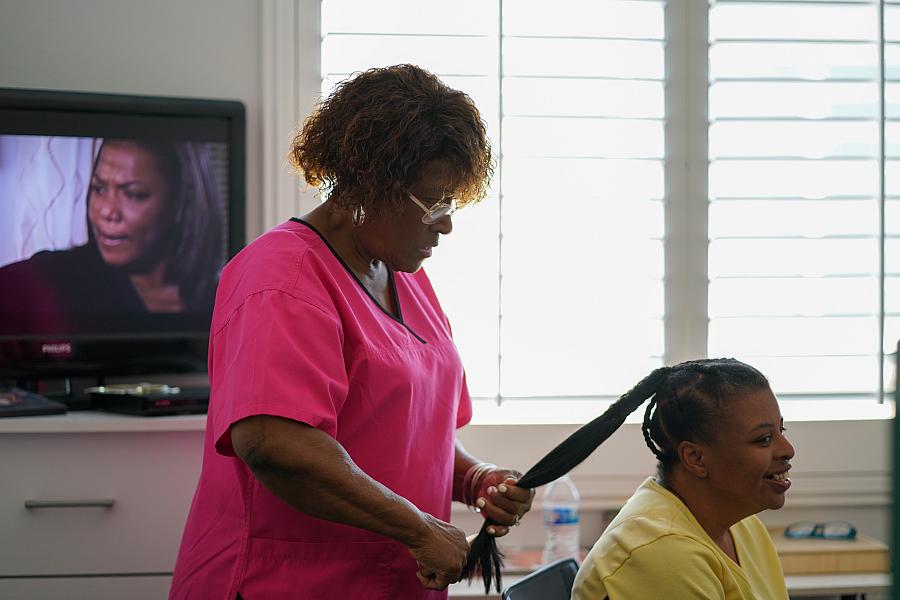
Gloria Roberson, 80, brushes the hair of Ebony Ross, 46, in their home in Jurupa Valley, California on October 14, 2024. Ross’s mother, who was a friend of Gloria, passed away in 2018 and asked for Ross to be placed under the care of Gloria, 80, and her husband, Winfred Roberson, 83. Years prior, Cheryeze’s mother, who was also a friend of Gloria, passed away and asked her to be placed under Gloria’s care. “That's the kind of family we are. We support each other in everything. [We’re] here for everything for Ebony or for Cheryeze.”
(Aryana Noroozi for Black Voice News/ CatchLight Local)
Sisters Christine Young and Maytha Goff
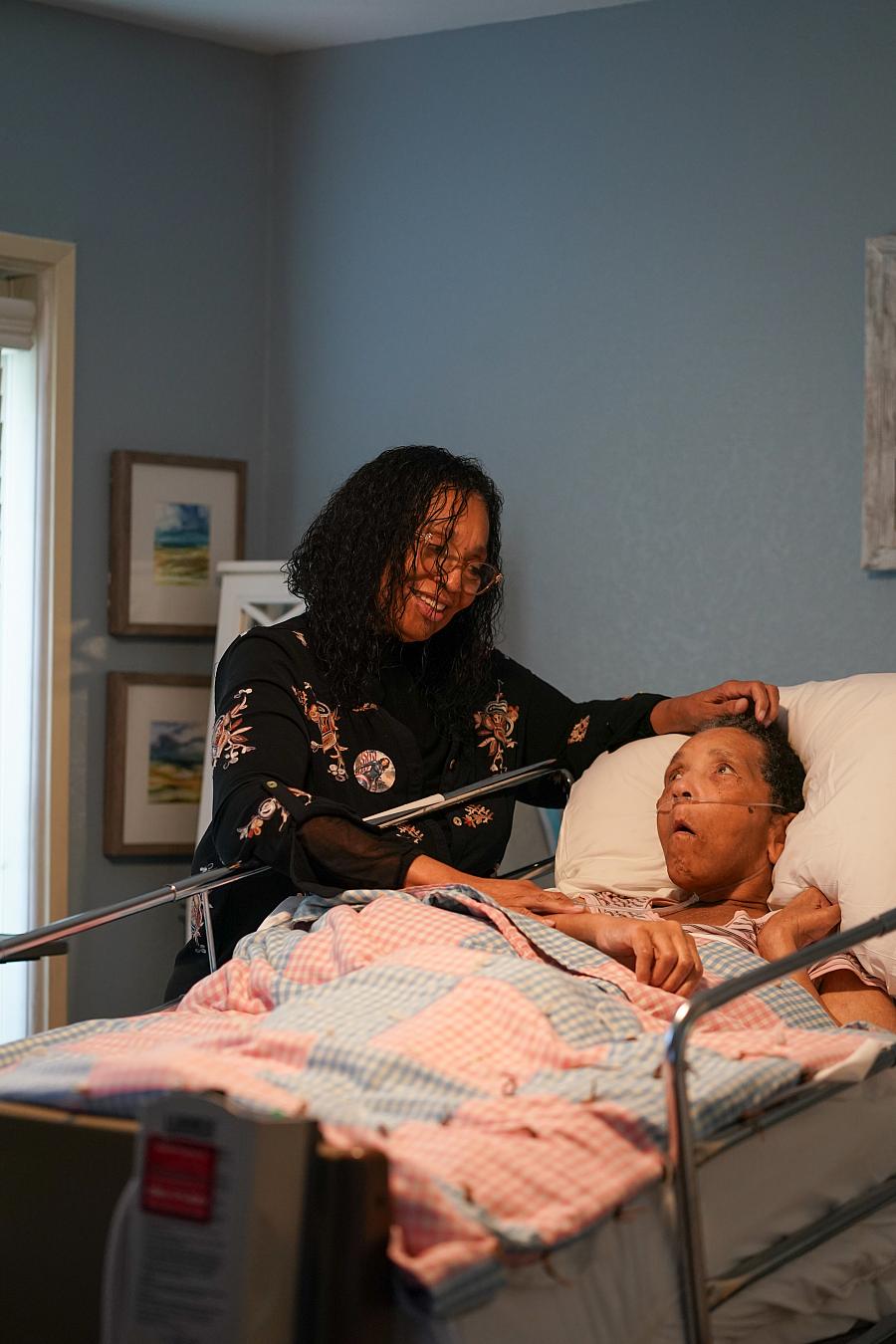
Sisters Christine Young, 66, and Maytha Goff, 73, pose for a portrait in their home in Corona, California on October 14, 2024. Young has been a caregiver for family members since her twenties, including her younger brother who suffered a traumatic car accident, her older brother as he aged and currently, her sister Maytha Goff. Goff struggled with her mental health and developmental delay her entire life. Earlier this year, Young took Goff out of a nursing home after she attempted suicide. “Who better to love them through this storm, but someone they know that's close to them, so I stopped saying, ‘Why me?’ [Because], why not me? I have a beautiful home. I have a beautiful life and I share this with my family.”
(Aryana Noroozi for Black Voice News/ CatchLight Local)
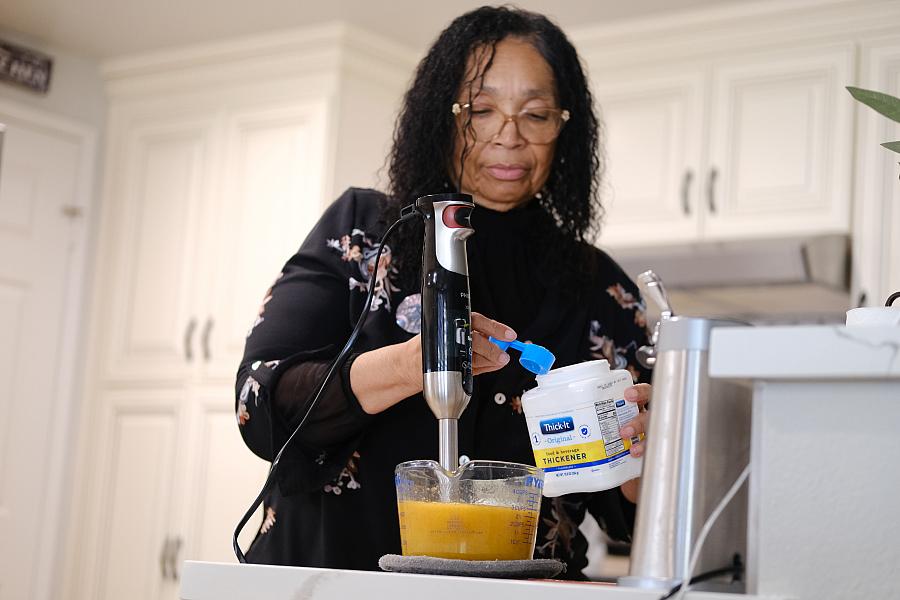
Christine Young, 66, purees peaches for her sister, Maytha Goff, 73, in her home in Corona, California on October 14, 2024. “They say it takes a certain kind of person to do this kind of work, [but] I think it takes someone who just cares enough to do it. When you change that dirty diaper, you're not focusing on the dirty diaper as much as I gotta make her more comfortable. I gotta clean her up so she can feel better. Because if I can't do anything but clean her up and make it feel better, that's a good thing.”
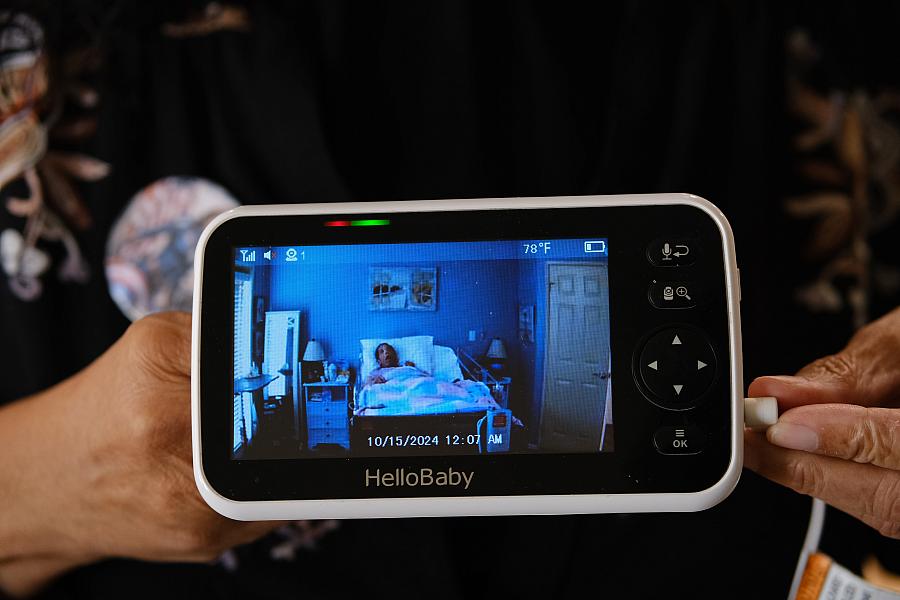
Christine Young, 66, holds the monitor in which she watches her sister, Maytha Goff, 73, from another room in her home in Corona, California on October 14, 2024. Since becoming a caregiver, Christine says her thought process has changed, “I appreciate myself. I appreciate who I am as a person. And I think about my health more.” She described lifestyle changes such as seeing a dietician, walking and practicing tai chi, and ultimately losing over one hundred pounds. “As a caregiver, especially when you're a family caregiver, it's more personal, it's more emotional. You hurt, and it's hard to separate it, because that is my sister in there…I can't walk away from her. So in order to do what I needed to do, I had to change my thought, change my mind, [about] the way I was thinking.”
(Aryana Noroozi for Black Voice News/ CatchLight Local)
This project is supported by the USC Annenberg Center for Health Journalism, and is part of “Healing California,” a yearlong reporting Ethnic Media Collaborative venture with print, online and broadcast outlets across California.

